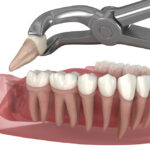Dental health is a crucial aspect of overall well-being, often underestimated until problems arise. The importance of maintaining good dental health is increasingly recognized, not just for aesthetic reasons but for its significant impact on general health. This article delves into the ever-unfolding importance of dental health, emphasizing tooth restoration and the vital process of finding a dentist.
The Foundation of Dental Health
Dental health encompasses the care and maintenance of teeth, gums, and the entire oral cavity. Regular brushing, flossing, and professional cleanings are essential to prevent cavities, gum disease, and other oral health issues. Neglecting these basic practices can lead to severe consequences, such as tooth loss, infections, and even systemic health problems like heart disease and diabetes.
Tooth Restoration: A Key to Dental Health
One of the pivotal aspects of dental care is tooth restoration. Tooth restoration refers to the various treatments and procedures used to repair and restore the function and appearance of damaged teeth. This can include fillings, crowns, bridges, implants, and dentures. Tooth restoration is not merely about aesthetics; it plays a critical role in maintaining proper oral function and overall health.
Types of Tooth Restoration
1. Fillings: Used to treat cavities by filling the decayed area with a material such as amalgam or composite resin. Fillings restore the tooth’s function and prevent further decay.
2. Crowns: These are caps placed over damaged teeth to restore their shape, size, strength, and appearance. Crowns are essential for teeth that are too damaged for fillings but not beyond repair.
3. Bridges: These are used to replace one or more missing teeth by anchoring artificial teeth to adjacent natural teeth. Bridges help maintain the natural alignment of teeth and the integrity of the jaw.
4. Implants: Dental implants are artificial tooth roots placed into the jawbone to hold a replacement tooth or bridge. Implants are a durable and long-lasting solution for missing teeth.
5. Dentures: These are removable replacements for missing teeth and surrounding tissues. Dentures can be complete (for all teeth) or partial (for some missing teeth).
The Importance of Tooth Restoration
Tooth restoration is crucial for several reasons:
– Functionality: Restoring damaged teeth ensures that you can chew and speak properly. Missing or damaged teeth can impair these basic functions, leading to dietary and communication difficulties.
– Aesthetics: Restored teeth improve your smile and overall appearance. This can significantly boost self-esteem and confidence.
– Preventing Further Damage: Addressing dental issues early with restorative procedures can prevent more serious problems down the line. For instance, filling a cavity prevents it from progressing to an abscess or necessitating a root canal.
– Overall Health: Poor dental health can lead to infections that spread to other parts of the body. Restorative procedures help maintain oral health, reducing the risk of systemic health issues.
Finding a Dentist: The First Step to Optimal Dental Health
Finding a dentist is a critical step in maintaining and restoring dental health. A good dentist can provide preventive care, diagnose and treat dental issues, and guide you through the process of tooth restoration. Here are some tips for finding a dentist who meets your needs:
1. Research and Recommendations
Start by asking friends, family, and colleagues for recommendations. Personal experiences can provide valuable insights into a dentist’s skills, bedside manner, and office environment. Online reviews and ratings can also be helpful in assessing the reputation of local dentists.
2. Credentials and Experience
Ensure that the dentist is licensed and has the necessary qualifications. Check their educational background, years of practice, and any specialized training they may have received. Experience, particularly in tooth restoration procedures, is crucial for ensuring high-quality care.
3. Office Environment and Technology
Visit the dental office to assess its cleanliness, organization, and the technology they use. Modern dental technology can enhance the accuracy and comfort of procedures. A well-maintained and equipped office reflects the dentist’s commitment to providing top-notch care.
4. Communication and Comfort
Effective communication between you and your dentist is vital. During your initial consultation, observe how the dentist listens to your concerns and explains treatment options. Feeling comfortable and understood can make a significant difference in your dental care experience.
5. Insurance and Payment Options
Verify whether the dentist accepts your dental insurance plan. Additionally, inquire about payment options and whether they offer financing for more extensive procedures. Understanding the financial aspects of your dental care is essential for avoiding unexpected expenses.
The Unfolding Importance of Dental Health
As research continues to uncover the connections between oral health and overall health, the importance of maintaining good dental health keeps unfolding. Conditions such as cardiovascular disease, diabetes, respiratory infections, and even certain cancers have been linked to poor oral health. This underscores the need for regular dental check-ups, prompt tooth restoration, and a proactive approach to finding a dentist who can provide comprehensive care.
Dental health is a vital component of general well-being. Tooth restoration plays a critical role in maintaining oral functionality and aesthetics, while finding a dentist is the first step toward achieving optimal dental health. By prioritizing dental care, we not only enhance our smiles but also contribute to our overall health and quality of life.





